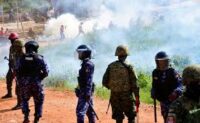Nigeria is grappling with a severe cholera outbreak, as more than 350 people have lost their lives to the water-borne disease in just the first nine months of 2024. According to the Nigeria Centre for Disease Control (NCDC), this represents a staggering 239% increase compared to the same period last year, underscoring the urgency of the country’s public health crisis.
Between January and September, the NCDC reported 359 cholera-related deaths, a sharp rise from the 106 deaths recorded during the same timeframe in 2023. The outbreak has also led to a surge in suspected cases, with over 10,800 individuals affected, up from 3,387 in the previous year. Most of the victims are young children under the age of five, highlighting the vulnerability of Nigeria’s youngest citizens to the disease.
Cholera, a bacterial infection primarily spread through contaminated water, is a recurring issue in Nigeria, particularly in areas where access to clean drinking water is severely limited. Both rural communities and densely populated urban slums remain especially prone to outbreaks. The absence of safe water sources in these regions creates fertile ground for cholera, which can spread rapidly through poor sanitation and inadequate hygiene practices.
Lagos, Nigeria’s bustling commercial capital, has recorded the highest number of suspected cholera cases so far this year. As the country’s largest city, Lagos is home to millions of residents, many of whom live in overcrowded informal settlements where access to clean water is scarce. These communities are at high risk of cholera and other waterborne diseases, making the need for urgent intervention all the more pressing.
In the northeastern state of Borno, already reeling from a humanitarian crisis caused by conflict and natural disasters, authorities have declared that the state is facing a new cholera outbreak. Compounding the situation, nearly two million people have been displaced due to severe flooding, exacerbating the spread of the disease. Floodwaters often become contaminated with human waste, heightening the risk of cholera transmission in affected communities.
Public health experts have called for immediate action to contain the outbreak and prevent further loss of life. The NCDC, alongside other government bodies and international partners, is working to implement emergency measures, including improving access to clean water and sanitation, raising awareness about cholera prevention, and enhancing early detection and treatment of cases.
However, the challenge is immense. In many regions of Nigeria, particularly in the rural north and conflict-affected areas, access to healthcare remains limited. Overstretched health facilities, a lack of trained personnel, and shortages of medical supplies are further straining efforts to curb the outbreak.
While cholera outbreaks are not new to Nigeria, the current surge in cases is alarming. It reflects the broader public health challenges the country faces, including inadequate infrastructure, poor sanitation, and the impacts of climate change, which have led to more frequent and severe flooding. Without swift intervention, the situation could deteriorate further, putting more lives at risk.
The NCDC has urged Nigerians, particularly those living in high-risk areas, to prioritize hygiene practices, such as boiling drinking water, washing hands with soap and clean water, and properly disposing of waste. These simple yet critical measures can significantly reduce the spread of cholera, especially in densely populated areas where outbreaks can escalate quickly.
As Nigeria continues to battle this deadly disease, the need for long-term solutions, such as investment in water infrastructure, sanitation, and healthcare access, has become more evident than ever. Addressing the root causes of cholera, rather than just managing the symptoms, is essential to preventing future outbreaks and ensuring the health and well-being of the nation’s population.














Leave a comment